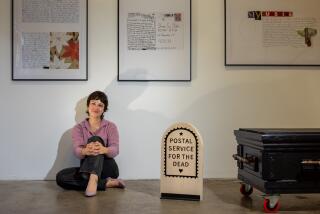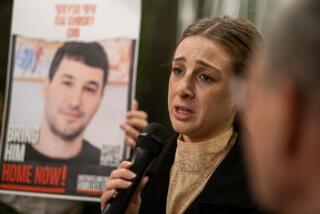Israel Conned Recluse, Family Says
- Share via
To his Leisure World neighbors, Simon Lechtuz seemed the penniless eccentric--a disheveled lifelong bachelor who seldom changed clothes and sought treasure in trash containers around Laguna Hills.
Little did they know Lechtuz was a millionaire who, in the final years of his life, had agreed to leave his $5-million fortune to the government of Israel in exchange for his burial there with full religious observance.
But when the 88-year-old died shortly after collapsing over a grocery store garbage bin, there was no trip to Israel.
Instead, he was buried unceremoniously in a secular Orange County cemetery.
A group of Lechtuz’s distant relatives went to court Wednesday, claiming that Israel and lawyers representing its Los Angeles consulate conned the retiree into willing his fortune to Israel by falsely promising him a proper Jewish burial in Israel.
The family, which has members in Southern California and Israel, exhumed his body from Orange County and reburied him in Israel. But they maintain the government broke its contract with the Polish immigrant. They are demanding that Judge James P. Gray void the will, a move that could clear the way for the family to receive the proceeds of his estate.
“It’s outrageous what they did,” said plaintiff Yoseffa Teitel, a niece from Woodland Hills. “They preyed on this man. They pursued him relentlessly and waited until he wasn’t well to get him to sign. Then, when he dies, they don’t even give him the one thing that he wanted: burial in Israel.”
Lawyers representing Israel deny any wrongdoing, saying they talked to Lechtuz about his funeral plans but never promised to bury him in Israel. They say opportunistic relatives are now foiling Lechtuz’s final wishes, which were to give roughly $1 million each to the Israeli army, navy, air force, the Israel Institute of Technology and the Hadassah Medical Organization.
“The fact is, the people who are bringing this suit never met Mr. Lechtuz,” said attorney Michael Greene, one of the group representing Israel. “Mrs. Teitel never had any communication with him in his life. It’s incredible they’re pursuing this. It’s a shame.”
Greene said the last thing Lechtuz wanted was for his family to inherit his fortune.
“He did not want them to benefit,” he said. “He stated that he wanted them to earn it.”
The case marks a rare instance in which a U.S. citizen agreed to will his estate directly to the government of Israel.
While testamentary gifts to Israeli organizations are common, they usually involve donations to intermediaries connected to Israeli veterans, health organizations or social service groups.
“I’m real surprised to hear that someone actually made a bequest to the government,” said Chelle Friedman, director of the Leisure World Region of the Jewish Federation of Orange County.
“Even here, people may think the Marines are wonderful, but who leaves money to them in their will?” Friedman said.
Much of the dispute focuses on Lechtuz’s state of mind when he signed the will, as well as the motivations of Israel’s lawyers. Lechtuz did not use his own lawyer to draft the document. Instead, he had lawyers working for the consulate draft the document and create a trust for his holdings.
Lawyers representing Israel argue that certain documents and correspondence between the consulate’s lawyers and Israel’s Ministry of Justice cannot be admitted into court because they are protected by diplomatic immunity. Lawyers for Lechtuz’s relatives said the documents are crucial to understanding the behind-the-scenes maneuvering by the government.
Determining Lechtuz’s thoughts could prove equally difficult. Even close friends describe him as a recluse who rarely discussed his personal life and rebuffed those who inquired about it. Friends who knew Lechtuz as a 15-year resident of Leisure World said they were shocked to learn that he had amassed such a fortune.
“I felt sorry for him,” friend and neighbor Jonel Konstanin said in court documents. “People avoided him because of his dirty appearance, his difficult foreign accent, his lack of personal hygiene and his odd, even weird, behavior. He looked like he didn’t have a dime and he wore the same clothes day after day.”
Born in Poland in 1912, Lechtuz moved to Palestine when he was 12 and later enlisted in the British Army during World War II. The two sides dispute portions of his history. His family says Lechtuz served in India during the war; the Israeli government said he also served with the Israeli Army.
In 1950 he immigrated to the United States, where he earned a living by bartering and trading leftover flour sacks and steel drums he collected from bakeries, and later he owned a furniture business, according to relatives. Eventually, he owned a number of properties.
Never married and without children, Lechtuz called the Israeli consulate in Los Angeles in July 1994 to discuss the possibility of making a bequest to the Israeli military and Hadassah Medical Center--the beginning of on-again-off-again negotiations that would last almost four years and frequently mentioned Lechtuz’s desire to be buried in Israel.
Those discussions are detailed in documents filed by the plaintiffs with the court.
In May 1995, a consulate lawyer, Susan Greenberg, wrote back saying that burial in military cemeteries is restricted to service personnel, but that “we are still checking with the Israel Defense Forces authorities on your behalf.”
Later that month, Greenberg wrote again to say “there are no mixed civilian and military (cemeteries) in Israel. However, my colleagues in Jerusalem suggested the purchase of a burial plot geographically adjacent to one for the military cemeteries.”
In 1996, Lechtuz wrote back to propose a new avenue, that he be flown to Israel “for final” and that the consulate take care of his will and his holdings. “The will is millions, 90 percent for Israel
Greenberg responded back that “it would be an honor to help with the matters discussed in your letter.”
The following year, Lechtuz met with another lawyer for the consulate, Marc Stern, to draft a will. It states:
“It is my wish that I be buried in a military cemetery in the state of Israel. If, however, only active members of the military can be buried in such a cemetery (as I have been advised is the current policy), then I wish to be buried in accordance with Jewish law in a cemetery in Haifa, Israel.”
Lechtuz, however, returned the copy of the will with one correction. Instead of stating that he “wished” to be buried in Israel, he said he “must” be buried there. The final will, however, did not include this wording.
In November 1998, Lechtuz suffered a stroke. Lechtuz’s doctor observed in February 1999 that he suffered from dementia.
In October 1999, Lechtuz told Stern that he was “ready to sign,” but turned the lawyer away at the Leisure World gate. After another visit, they met in the recreation room and Lechtuz signed the document.
On Oct. 9, 2000, Lechtuz was found slumped over a garbage can in front of a supermarket in Laguna Hills. He was taken to a hospital and died Nov. 1. Because he had no immediate family and no one came forward, a county official ended up arranging burial at a local cemetery.
Lawyers for the defendants say the government never formally promised to bury Lechtuz in Israel. Officials said they accepted his estate with no strings attached.
Greene, the attorney representing the defendants, said the correspondence also shows that Lechtuz was clear-headed when he wrote the will and was not being pressured by the consulate lawyers.
“Mr. Lechtuz was a strongly independent guy,” he added. “He knew what he wanted.”
Family members didn’t know Lechtuz had died until lawyers for the Israeli government informed them while adjudicating the will. Teitel and other family members said they were angry after learning that the government would collect his estate even though it didn’t bury him.
Teitel said that after contacting other relatives in Israel, the family pooled resources and paid $15,000 to have Lechtuz’s body removed from Orange County and transported to a burial site in Haifa.
Teitel acknowledged that she had never met her uncle, but she said she felt it was her duty to act on his behalf.
“We knew he was reclusive and we respected that,” Teitel said. “But for these people to say there was no agreement to bury him, that’s just baloney.”
More to Read
Sign up for Essential California
The most important California stories and recommendations in your inbox every morning.
You may occasionally receive promotional content from the Los Angeles Times.











